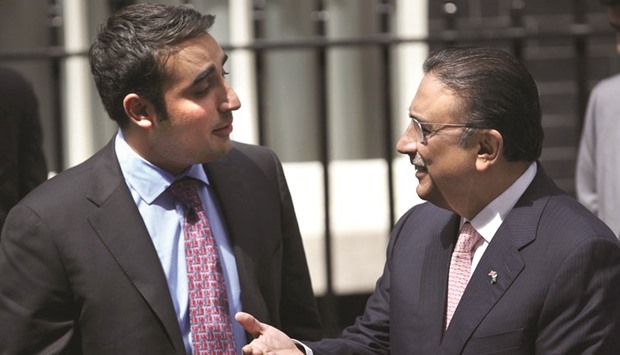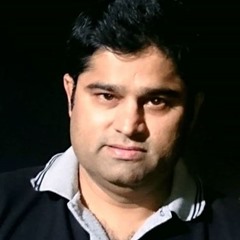Interestingly, Pakistan’s oldest political family – dynasty is probably more like it – is also the nearest thing to celebrated royalty of the kind we have in Britain and from which the country achieved independence in 1947.
But it is highly debatable if the current Bhuttos – or to be more precise, the hyphenated variety (Bhutto-Zardari) – can hold a torch to the erstwhile ones: the acclaimed prime minister father-daughter duo of Zulfikar Ali Bhutto and Benazir Bhutto.
But for a polity largely hinged on the Sharifs (Prime Minister Nawaz and his brother, Punjab chief minister Shahbaz) versus Imran Khan for a better part of the last half decade, the news cycle has something to cheer about with the return of Asif Zardari at the end of last year.
The former president and Co-Chairman of the Pakistan People’s Party (PPP) is widely considered to be the shrewdest politician in a country hooked on trying to forever figure out his moves when he pulls out the chessboard.
Forget fervent supporters, there is no dearth of enemies and frenemies who, like or loathe, concede Zardari’s craft in moving the pieces – and them – to utter frustration. Veteran Javed Hashmi, a member of the flock, once famously gave vent to his exasperation by suggesting one had to have a “PhD in politics” to understand Zardari. The more grounded can be forgiven perhaps, for thinking if even that degree would not suffice to configure the Zardari Art of Political Gamesmanship.
It is against this backdrop that Zardari manoeuvred to land home just ahead of his late spouse Benazir Bhutto’s 9th death anniversary last month after more than one-and-a-half years of self-imposed exile.
In one of his rare cavalier moments back in June 2015, the PPP co-chairman warned the military establishment against “over-reaching” its mandate in Karachi lest “we tear you down brick by brick”.
So stunning was the tirade – in which Zardari also pointed to the short and long of tenures: army chief (“three years”) and political parties (“forever”) – that its after-effects prompted him to virtually flee from the country immediately.
General Raheel Sharif, the-then army chief, who retired last November, was riding an immense popularity wave at the time for a hard-hitting anti-terror campaign that led, amongst other things, to the arrest of Zardari’s close confidantes over alleged links to terror financing.
Fast forward to the PPP leader having reportedly, prevailed upon Prime Minister Nawaz Sharif to deny an extension to General Sharif after calls to this effect began to make a round for much of last year. One of the first things Zardari did after General Qamar Javed Bajwa replaced General Sharif was to congratulate the new boss in a notable move to mend fences with the military establishment and three weeks later, he was back home.
What preceded Zardari’s return was the rather vocal and consistent anti-Sharif campaign led by Bilawal Bhutto-Zardari, his 28-year-old son and the party’s chairman. For the uninitiated, the scion was anointed the party’s leader at 19 by Zardari, who also appended his surname to the original moniker Bilawal Bhutto – just three days after his spouse Benazir was assassinated in 2007. It was a studied gambit to encash the sympathy wave on the eve of the 2008 general elections; and of course, the rich political legacy in the long term.
In the lead-up to the annual December 27 ritual to mourn the loss of Benazir at Garhi Khuda Bux, the ancestral final resting place of the Bhuttos, there was frenzied expectation of the announcement to kickstart an anti-Sharif campaign premised in the so-called Panama Papers case allegedly involving the children of the prime minister, but in typical Zardari fashion, the form book was upended by a declaration that has left both the connoisseur and the layman flummoxed.
Far from even mentioning the four demands his son had been drumming the previous months to tired ears, Zardari announced that he and his son were both set to enter the current parliament! Let alone buttress Bilawal’s shrill campaign to hit the streets if the Sharif government failed to meet the demands by December 27, Zardari made it known who was to make way for them to enter the House, in the bye-elections.
Few observers failed to notice a slightly pensive Bilawal as the former president only casually targeted Sharif, and in a first, did not even mention his late spouse’s name even once during the commemoration! He also made it a point to drive home to Sharif that his and the scion’s entry was not aimed at “snatching your seat” but to “strengthen the system” and groom Bilawal.
Days later, the commentariat is nowhere near reaching a conclusion as to what Zardari’s new gambit is all about. To be fair to the political pundits, there are obvious and rather stark question marks driving the latest ‘method in madness’.
To begin with, Zardari’s return has apparently undercut the much hyped reinvention of the PPP – there’s certainly no denying a crying need for one after its spectacular decline since losing power in 2013. The latest edict has only reinforced Zardari’s stranglehold over the party, smudging the hope that his exile was meant to allow his son to refashion the PPP.
Intriguingly, it is uncertain how the father and son’s entry into the parliament will reshape the contours of party leadership. Khurshid Shah, Opposition Leader in the National Assembly (lower house of the bicameral legislature), has said it was “obvious” that Bilawal would assume the mantle from him.
The party has denied this.
On the other hand, what would a former president do just sitting in the parliament as an ordinary member if he is not to replace Shah or take up the parliamentary party leadership? There is no official word on this either. Aitzaz Ahsan, a party stalwart, only conjectured to say that neither of the father-and-son duo would take up a leadership role.
So what’s really cooking? Trust Zardari to keep everyone guessing!
* The writer is Community Editor.

TWO GOOD? PPP Co-Chairman Asif Zardari with his son Bilawal Bhutto-Zardari.

